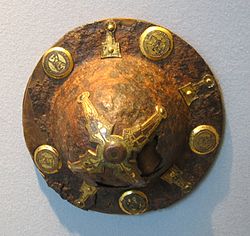Arioald

Arioald , also Aroal, Charoald, Ariopalt, Ariwald , († 636 ) was until 626 dux Taurinensium civitatis (Duke of Turin ) and from 626 to 636 King of the Lombards .
Life
Arioald came from the family of Caupus ( ex genere Caupus ). He held the office of dux ( Duke ) of Turin until 626 and was married to Gundeperga , a sister of King Adaloald . Unlike his wife and the king, he was an Arian .
King Adaloald showed signs of mental illness from 624 onwards. Various accounts of the further events circulate in the sources, but these are contradictory. Apparently there was an opposition from Lombard princes against Adaloald and the politics of his mother Theudelinde . There were probably lengthy battles between the rebels and the king, in which the Pope wrote to the exarch Isaac in Ravenna in favor of Adaloald , while several schismatic bishops supported the usurper Arioald. Adaloald was deposed in 626 and his brother-in-law Arioald was made king.
Little is known about Arioald's ten-year reign. His authority over the Lombard dukes was so weak that the defense against the Avars on the northeast border was left to the dukes of Friuli. Only internal unrest among the Avars prevented severe defeats of the divided Longobard Empire.
According to legend, Arioald is said to have been converted by the abbot Attalo of Bobbio Abbey through a double miracle when he ascended the throne . He brought the monk Blidulf, murdered by Arioald, to life and freed the king from an obsession to which he had fallen as a punishment for his murder.
Arioald was tolerant on religious issues. When the schismatic Bishop of Dertona wanted him to entrust the supervision of the Bobbio monastery while the monks defended the monastic independence that Columban had preserved according to Irish tradition, Arioald declared that it was the task of the synods to resolve internal disputes of the clergy to clarify. The monastery was subordinated to the Pope in 628 and thus an outpost of Catholicism in the Longobard Empire.
He accused his wife Gundeperga of adultery and imprisoned her for three years in Laumellum ( Lomello ), but then released her on the intervention of the Merovingian Chlothar II .
With the Frankish king Dagobert I he concluded an alliance treaty around 631 and went together with him in a campaign against the Slavic empire of Samo . The Lombards took many prisoners, but the campaign had to be broken off because of high Franconian losses.
Around 634 Arioald is said to have waived a third of the annual tribute to the exarch Isaac, so that he could murder the rebellious dux Taso of Tuscia.
After Arioald's death in 636, Rothari , Duke of Brescia, was elected as his successor.
Legend has it that Gundeperga, the widowed queen, called Rothari to Brescia. She asked him to cast his wife out, marry her and rule as king. Rothari agreed and was elected king by the Lombard nobility.
swell
- Paulus Diaconus : Historia Langobardorum , in: Ludwig Bethmann, Georg Waitz (ed.): Scriptores rerum Langobardicarum et Italicarum saec. VI-IX. Hanover 1878, pp. 12–28 ( Monumenta Germaniae Historica , digitized version )
- Fredegar : Chronik IV, 49-70, in: Bruno Krusch (Hrsg.): Scriptores rerum Merovingicarum 2: Fredegarii et aliorum Chronica. Vitae sanctorum. Hanover 1888, pp. 145–156 ( Monumenta Germaniae Historica , digitized version )
literature
- Jörg Jarnut : History of the Longobards , Stuttgart 1982. ISBN 3-17-007515-2 .
- Wilfried Menghin : The Lombards. Archeology and history . Theiss-Verlag, Stuttgart 1985, ISBN 978-3-8062-0364-6 .
- Charlotte Schroth-Köhler: Ariwald (Arioaldus) . In: Lexicon of the Middle Ages (LexMA). Volume 1, Artemis & Winkler, Munich / Zurich 1980, ISBN 3-7608-8901-8 , Sp. 951.
- Older literature (partly out of date)
- Ludo Moritz Hartmann : History of Italy in the Middle Ages . Vol. II Part 1, Wigand, Leipzig 1900, pp. 207 ff. ( Digitized version )
- Thomas Hodgkin: Italy and her Invaders . Vol VI. Oxford 1895, p. 160 ff. ( Digitized version )
Web links
- Italy, Emperors & Kings (English)
Individual evidence
- ↑ Origo Gentis Langobardorum 6, MGH SS rer Lang I, p. 6f
- ↑ a b c Fredegar, IV, 49-51
- ↑ Hartmann, History of Italy in the Middle Ages, Vol. II Part 1, p. 208
- ^ Paulus Diaconus, Historia Langobardorum IV, 41
- ↑ Charlotte Schroth-Köhler: Ariwald (Arioaldus) . In: Lexicon of the Middle Ages (LexMA). Volume 1, Artemis & Winkler, Munich / Zurich 1980, ISBN 3-7608-8901-8 , Sp. 951.
- ↑ Bruno W. Häuptli: ATTALA by Bobbio. In: Biographisch-Bibliographisches Kirchenlexikon (BBKL). Volume 24, Bautz, Nordhausen 2005, ISBN 3-88309-247-9 , Sp. 136-140.
- ↑ Hartmann, History of Italy in the Middle Ages, Vol. II Part 1, p. 209
- ^ Fredegar, IV, 68
- ^ Fredegar IV, 69
- ^ Paulus Diaconus, Historia Langobardorum IV, 42
- ↑ Fredegar, IV, 70
| predecessor | Office | successor |
|---|---|---|
| Agilulf ? | Duke of Turin ? –626 |
? |
| Adaloald |
King of the Lombards 626–636 |
Rothari |
| personal data | |
|---|---|
| SURNAME | Arioald |
| ALTERNATIVE NAMES | Aroal; Charoald; Ariopalt; Ariwald |
| BRIEF DESCRIPTION | King of the Lombards |
| DATE OF BIRTH | 6th century or 7th century |
| DATE OF DEATH | 636 |